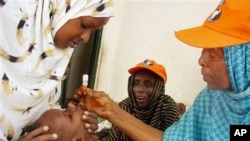As part of the re-set of relations between the United States and Russia, and under the auspices of the Bilateral Presidential Commission, representatives of the two countries signed a Protocol of Intent on Cooperation for the Global Eradication of Polio.
The initiative will be executed through the U.S. Agency for International Development, or USAID, the U.S. Department of Health and Human Services, or HHS, and the Ministry of Health and Social Development of the Russian Federation.
"The world has had a tremendous amount of progress in the last 15 years in getting to the very edge of polio eradication, and we are so close to eradicating polio completely from the planet," said Dr. Rajiv Shah, U.S. signatory on behalf of USAID. "Our partnership with Russia is just one expression of how we're trying to make that a reality."
Poliomyelitis, or Polio, an infectious viral disease that spreads from person to person, has plagued humans since the dawn of history. If it attacks the central nervous system, it can be devastating. It may cause varying degrees of paralysis, and in extreme cases, death. And while it can strike at any age, the disease mainly affects children under the age of three.
A global drive to eradicate the disease began in 1988, and as a result, the number of annual diagnosed cases has been reduced by 99 percent. However, recently there were a number of wild polio outbreaks in Africa and Central Asia. New cases were also confirmed in Russia that have been linked to the importations in Central Asia.
"With concerted effort by the international community to overcome the remaining reservoirs of virus and closing the immunity gaps in polio-free areas, there is room for optimism that we will achieve the Global Eradication Milestone of stopping transmission in two of four endemic countries and stopping all re-importations by the end of 2011," said Dr. Shah.
According to the World Health Organization, India, Pakistan, Afghanistan and Nigeria are the only four countries left where the Polio virus is maintained within the population, or endemic.
"Ridding the world of this preventable disease will dramatically reduce the global burden of disability and death from polio, especially among the world's children," said Dr. Nils Daulaire, U.S. signatory on behalf of HHS. "We are pleased to have this opportunity to strengthen our partnership with our Russian colleagues to work towards a world without polio."
U.S. - Russia Cooperation on Polio

Representatives of the two countries signed a Protocol of Intent on Cooperation for the Global Eradication of Polio.



